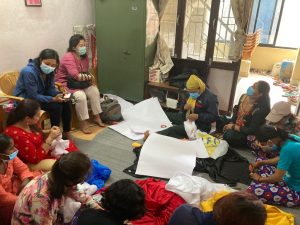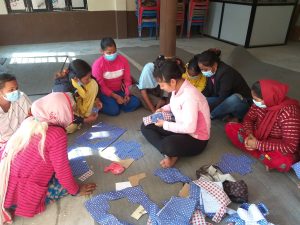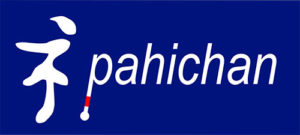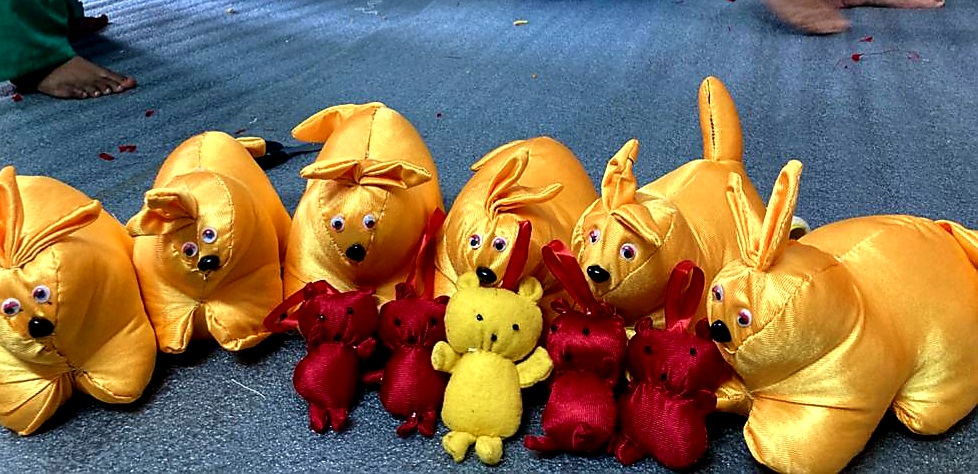Soft dolls and Key rings making training on 27th September to 30th October in Kathmandu (capital of Nepal) including 10 women with disabilities
 Under the support of The Pollination Project, Pahichan Nepal conducted the training to make Soft dolls, Key rings and reusable pads along with SRHR sessions in Kathmandu and outside valley. For the soft dolls training. We included 10 women with disabilities including who were blind, visually impaired (low vision), having physical disability and hard of hearing held on 27th September to & 30th October (2021) for 4 days. The participants were from the inside and outside the valley whereas, two of them also reside in Pahichan Nepal for the overall training period. The training was facilitated by the woman having physical disability who also assisted voluntarily for the deaf participant throughout the training period. The participants got to learn about the cutting and stitching techniques for dolls and key rings making. The learning environment was so friendly and mutually collaborated by one another.
Under the support of The Pollination Project, Pahichan Nepal conducted the training to make Soft dolls, Key rings and reusable pads along with SRHR sessions in Kathmandu and outside valley. For the soft dolls training. We included 10 women with disabilities including who were blind, visually impaired (low vision), having physical disability and hard of hearing held on 27th September to & 30th October (2021) for 4 days. The participants were from the inside and outside the valley whereas, two of them also reside in Pahichan Nepal for the overall training period. The training was facilitated by the woman having physical disability who also assisted voluntarily for the deaf participant throughout the training period. The participants got to learn about the cutting and stitching techniques for dolls and key rings making. The learning environment was so friendly and mutually collaborated by one another.
For the soft dolls making training, we selected 10 participants (women with disabilities) currently residing in Kathmandu. To motivate the participants to build their capacity and skills development, we also managed to hire a facilitator, a woman with disability who has been succeeding in her career. For those, who has the mobility issues, we managed them to reside in our communal house so that they could learn and participate in the training. The lunch and transportation charge were provided to the participants. The training was executed voluntarily so well that the woman having physically disability were supporting blind women for the cutting and making drafts. The first day of the training was the introductory session about the materials and making drafts. The drafts was made with a thick cardboard in order to make it accessible for the blind and partially sighted participants so that they can also easily draw the draft. The second session was all about cutting and stitching the drafts which was made on the first day. The blind participants were struggling with the stitching of the cloth but with the assistance of the trainer and other participants having physical disability, it was succeeded. After 3 days of learning, the participants finally made the final product.
The last day of the training was decided as the closing ceremony to exhibit the products made by our beneficiaries where the mayors and Deputy Mayors was invited. After analyzing our product, the deputy mayor gave us the commitment to support us in the marketing and mobilizing the products in the market.
Pad making training on 9th December to 11th December in kapilvastu District (Western Part of Nepal) including 10 Madhesi women with disabilities.
 In the context of Pad making training, it was held in Kapilvastu district, Western part of Nepal on 9th December to 11th December. The training was 3 days long with the motive to promote cotton pad and maintain menstrual hygiene facilitated by the Registered Nurse. We included 10 women with disabilities who were blind, partially sighted, having physical disability and having multiple disability. The participants were very keenly interested to learn and were sharing and talking openly about their issues they were facing. After the pad making workshop, the session about SRHR was also conducted to the women with disabilities.
In the context of Pad making training, it was held in Kapilvastu district, Western part of Nepal on 9th December to 11th December. The training was 3 days long with the motive to promote cotton pad and maintain menstrual hygiene facilitated by the Registered Nurse. We included 10 women with disabilities who were blind, partially sighted, having physical disability and having multiple disability. The participants were very keenly interested to learn and were sharing and talking openly about their issues they were facing. After the pad making workshop, the session about SRHR was also conducted to the women with disabilities.
For the pad making training, the workshop was conducted in Kapilvastu district for the local women with disabilities of that respective region. The session was started introducing our organization, our activities and goals among the participants. We made sure to keep the learning environment disability friendly and accessible for the blind participants making the drafts in a thick cardboard which will be easier for the blind and partially sighted women with disabilities in cutting and stitching the pad cloth. After making the drafts, there was an hour session of SRHR familiarizing them with menstrual hygiene, safe pregnancy and ways to maintain menstrual hygiene. The second session was all about cutting and stitching of pads.
We hired a facilitator a registered nurse where she also orient the women with disabilities about menstrual hygiene, safe pregnancy, contraceptive devices as well as demonstrated some of the measures and remedies for the women suffering from pelvic organ prolapse.
In the 3rd day of pad making, we conducted closing ceremony where we invited Ward president of Kapilvastu district, president of women’s group, president of Blind association, kapilvastu and other stakeholders as well. They gave a big applause and appreciated our efforts and the contribution we have been providing to support and liberate the life of women with disabilities which made our whole purpose of initiating and conducting the program worth.
The team from TEWA Nepal gave us a positive feedback and also suggest for the marketing of the products so that we could operate it further more whereas the deputy mayor of Dakshinkali, Kathmandu also committed to support us in the marketing and promotion of our products which will give a good exposure in the market. The participants also appreciated the training so well that they suggest us to conduct such type of vocational trainings more so that they could develop skills from the workshop and start self-entrepreneurship themselves to live in a dignity and independently. Among the participants, Asmita Sainju; visually impaired girl suggest to extend the training more in order to learn more about the products and the techniques for its marketing. Besides this, the other local men and women who visited our workshop, also praised our workshop and showed their interest to make the reusable pads. Therefore, the overall project was very fruitful.



